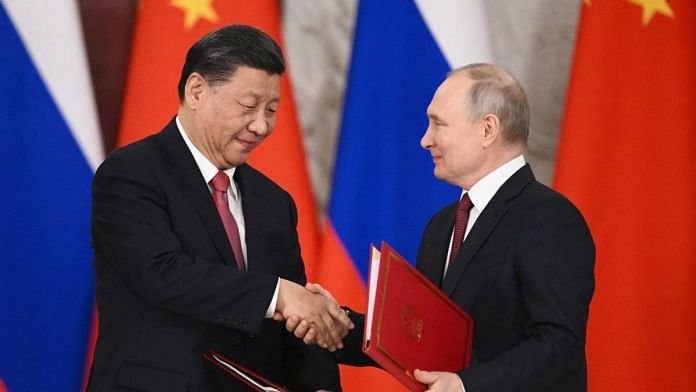October is an important month for China. In 1949, the foundation of the communist state was laid, avowedly to challenge imperialism and the West’s capitalist market model through Marxism. Over the past 74 years, however, China has emerged as a shining example of Capitalism, a hegemonic imperialist—although with Chinese characteristics—and has basically turned Marxist principles upside down.
This month marks three important events that will, in all probability, determine the future economic course of China and the global economy. First, amid the Russia-Ukraine war and another fresh conflict in the Middle East, Russian President Vladimir Putin is in China to meet his “dear friend” Xi Jinping to affirm the “no limits partnership” between the two countries. Second, China is hosting a high-level summit to ‘celebrate’ 10 years of Xi’s signature project, the Belt and Road Initiative (BRI), touted as a game changer in its geopolitical and geo economics engagements. The third and more significant aspect is the beginning of the fourth quarter (Q4) of the Chinese economy after a not-so-satisfactory Q3.
The rise & fall of BRI
BRI was unveiled in 2013 as part of Xi’s ambitious plan to develop new trade routes connecting the Chinese economy with the rest of the world. This route would include emerging economies in Southeast Asia and developed economies in the West, particularly Europe, totalling 150 countries and institutions. In reality, the BRI was far more than just an economic project. It was China’s gigantic strategic plan to scale up its outreach with other developing countries, strengthen technological capabilities through an ingenious natural resource mopping model, and emerge as a strong power that would dislodge the US from its numero uno position. How far China has been able to achieve these objectives is yet to be assessed, but it surely hasn’t been an easy path as Beijing may have envisaged 10 years ago.
Xi’s position was quite different in 2013. He was the president of China, the Secretary General of the Communist Party, and the chairman of the Central Military Commission – a three-in-one leader whose stature was estimated to be a notch above that of Chairman Mao. Beijing’s rise and increasing influence became the talk of the town, and an increasing number of strategic experts began assessing its growth trajectory positively. But as projects and related debts, economic aid packages, and infrastructure plans began to unfold, smaller and weaker economies started feeling the burden of taking loans from China. The Covid-19 pandemic and the Russia-Ukraine war created further roadblocks for the already stressed economies.
Also read: Taliban says it plans to formally join China’s Belt and Road Initiative
Economic decline
Now, China’s once-thriving economy has entered a sluggish phase. It has registered a decline in GDP growth figures—from 6.3% in April-June quarter to 4.9% in July-September quarter—and could be staring at a rising unemployment crisis. Its real estate market has taken a hit as well.
Moreover, the BRI, which was generously compared to the US’ Marshall Plan and touted as a magic wand solution to the 2008 banking crisis that triggered a global economic downturn, has itself been encountering problems. This was probably because it used the same tools that led to the real estate doom in the US. Country Garden, one of the largest property developers in China, declared a $6.7 billion loss and missed interest payments on its bonds.
The Caixin S&P Global Manufacturing Purchasing Managers’ Index (PMI), in its survey of 650 private and state-owned manufacturers engaged mainly in export-oriented goods, found that the PMI had risen from 49.2 in July to 51 in August.
Even before the investors could heave a sigh of relief, the official PMI survey of over 3,200 manufacturing units released in August reported that manufacturing in China has contracted for the fifth consecutive month. This prompted authorities to announce a series of tax reliefs and incentives to fuel consumer spending. US President Joe Biden wasn’t perhaps wrong in calling China “a ticking time bomb”.
Also read: World has pushed Kim and Putin closer. Worried China will fish in troubled waters
BRI restricted to Asia
Italy was the only G7 country that was part of the BRI, but it is not attending the BRI@10 meet, signalling its withdrawal from the initiative. Hungary has been an ardent supporter but does not seem to represent the European Union. Going by the lacklustre response from EU and some African countries, the BRI is limited to Asia in general and South Asia in particular, where Indian interests are strategic and significant in nature.
Strict anti-Covid measures angered people in China—to the extent that protesters held posters saying “Xi Jinping step down; CCP step down”. There are reports of dissatisfaction among a section of CCP’s senior leadership who are allegedly concerned about economic crisis and social tensions assuming larger proportions. Xi himself is reported to have expressed concern over dwindling party membership and the problems it could create.
The ‘BRI@10’ anniversary bash comes at a time when Xi needs validation for managing the Chinese economy well, not deviating from Marxist principles and challenging the West’s failed market model. With his “best friend” Putin by his side and BRI defaulters caught in a debt trap applauding, the Chinese president has won this round in the CCP and among detractors at home and abroad. But he will soon need an alternative to BRI before the CCP starts looking for an alternative to him.
Seshadri Chari is the former editor of ‘Organiser’. He tweets @seshadrichari. Views are personal.
(Edited by Zoya Bhatti)



